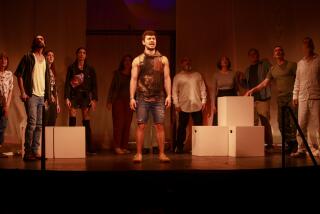Call These ‘Moby-Dick’ Readers Determined
- Share via
What is it, what nameless inscrutable, unearthly thing is it?
The journey began with “Call me Ishmael” Thursday morning under the bright purple blossoms of a jacaranda tree outside UCLA’s Rolfe Hall.
It continued throughout the night, as a crew of brave souls read by moonlight, a bronze bell sounding every 10 minutes to keep sleepy participants on board.
And on Friday morning, 25 hours after the thick copies of “Moby-Dick” were first cracked open, the marathon reading of the venerable classic was done.
In all, more than 200 UCLA English students, staff, faculty and community members participated in the recitation of Herman Melville’s dense and daunting classic.
The reading of Captain Ahab’s search for the white whale, traditionally a source of consternation for students, began as an intellectual quest and evolved into a fund-raiser for UCLA’s English department.
Greg Jackson, a graduate student and organizer of the marathon, said students settled on Melville’s epic after deciding between it and James Joyce’s “Ulysses.”
“The whale seems to be this really pervasive thing,” Jackson said. “It’s very ubiquitous, yet it’s very elusive--it seemed like a good thing to chase.”
Oh, my Captain! My Captain! . . . Why should any one give chase to that hated fish?
Under the hot sun Thursday, readers drifted in and out: literature fans, whale lovers and students who needed to read the book by Monday for professor Barbara Packer’s English 171A class. All took 10-minute turns reciting Melville’s prose with a range of inflections, accents and passion.
As night fell, 29-year-old Damian Stocking stumbled through Chapter 63, an arcane description of harpooning. It didn’t diminish his zest for the text.
“I think ‘Moby-Dick’ is the best book ever,” said the graduate student in comparative literature. “It’s about the way Americans distinguish themselves from Europeans. They don’t fear the incommensurable or the mysterious. They embrace it, and/or kill it--usually both.”
As the sky lightened to blue at dawn Friday, about 20 students lay snug under sleeping bags on the lawn. Four stoic figures sat immobile watching a reader under the growing light. By now they had reached Chapter 81: “The Pequod Meets the Virgin.”
It had been a rough night at sea. Two readers had alternated between 3 and 4 a.m., since most of the sleeping crew was too tired to rouse. Rations were going quickly: Four of the six pounds of coffee purchased for the voyage were already consumed.
The lines between Ahab’s obsession and the students’ mission began to blur.
“It’s the whole idea of the quest for something unnameable. And, really, what it is materially that you’re searching for is not important, but just the search itself, the megalomaniacal search,” said Chris Halmo, a 22-year-old senior English major. “I think we can all somehow empathize with the Ahab character.”
There she blows--there she blows!
By 10 a.m. Friday, a haggard Jackson readied himself to read the second-to-last passage.
“All of us feel like Ahab. . . . It got very elusive at times,” Jackson would say later. “It got weirder and weirder. This was the only thing to do. That’s why we felt like Ahab--we were a little overly focused.”
The reading sped up to breakneck pace after the slow knots taken in the early morning.
Ahab’s ship, the Pequod, began “The Chase” about 10:30 a.m., and as the waters got choppier people streamed into the quad, waiting for the ship to meet its fate.
At least 200 assembled as actor Charlton Heston dramatically read the last chapter, guiding the sinking Pequod into the surf. As Ahab perished, the crowd rose to a standing ovation.
Heston smiled.
“Pretty good writer, huh?” he said.
More to Read
Sign up for our Book Club newsletter
Get the latest news, events and more from the Los Angeles Times Book Club, and help us get L.A. reading and talking.
You may occasionally receive promotional content from the Los Angeles Times.










